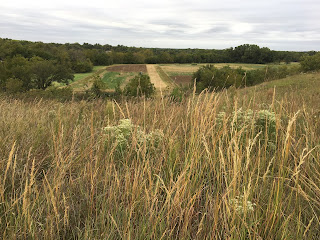Last week I had the pleasure of hosting Bill Vitek at Augustana University. Together we taught a philosophy class and a biology class, he spoke in our chapel, and he gave a lecture on campus.
One of the persistent themes of his work is the connection between culture and agriculture: the two shape one another.
Another theme that is related to the first: we all eat, and we all think, and eating and thinking indluence one another.
A third theme: we tend to focus our thinking on the annual or the short-term, neglecting the perennial and long-term. having spent a few days with Bill, I'm now reflecting on what I find one of the most provocative parts of his work: what would it mean to shift from thinking of education as an annual crop to thinking of it as a perennial? Currently we begin planting at the beginning of the season, and we expect to harvest grades and graduates at the end of the term.
What if we thought of education in the way we think about caring for perennials? What if we considered school to be more like the planting of trees than like the planting of corn? Or what if we figured out a way (as they are doing at the Land Institute, where Bill is a collaborator with Wes Jackson - here's a link to one of their co-edited books) to give our annual crops perennial roots?
I have a lot of work and thinking and cultivating ahead of me, so I won't answer those questions here. If you have taken my classes, you already know how I have been working on this over the years (think of how I speak about grades and exams in my classes, for instance). And if you've read my books (like my book on C.S. Lewis' environmental thought, or my book on brook trout as indicators of both natural ecology and cultural ecology), you know I'm working on these ideas, and they will require long cultivation. I'm okay with that.
For now, feel free to listen to Bill and me as we are interviewed by Lori Walsh on South Dakota Public Radio.
One of the persistent themes of his work is the connection between culture and agriculture: the two shape one another.
 |
| A bit of prairie, with perennial grasses. |
Another theme that is related to the first: we all eat, and we all think, and eating and thinking indluence one another.
A third theme: we tend to focus our thinking on the annual or the short-term, neglecting the perennial and long-term. having spent a few days with Bill, I'm now reflecting on what I find one of the most provocative parts of his work: what would it mean to shift from thinking of education as an annual crop to thinking of it as a perennial? Currently we begin planting at the beginning of the season, and we expect to harvest grades and graduates at the end of the term.
What if we thought of education in the way we think about caring for perennials? What if we considered school to be more like the planting of trees than like the planting of corn? Or what if we figured out a way (as they are doing at the Land Institute, where Bill is a collaborator with Wes Jackson - here's a link to one of their co-edited books) to give our annual crops perennial roots?
 |
| A view of the Augustana University campus, with historic buildings. |
I have a lot of work and thinking and cultivating ahead of me, so I won't answer those questions here. If you have taken my classes, you already know how I have been working on this over the years (think of how I speak about grades and exams in my classes, for instance). And if you've read my books (like my book on C.S. Lewis' environmental thought, or my book on brook trout as indicators of both natural ecology and cultural ecology), you know I'm working on these ideas, and they will require long cultivation. I'm okay with that.
For now, feel free to listen to Bill and me as we are interviewed by Lori Walsh on South Dakota Public Radio.